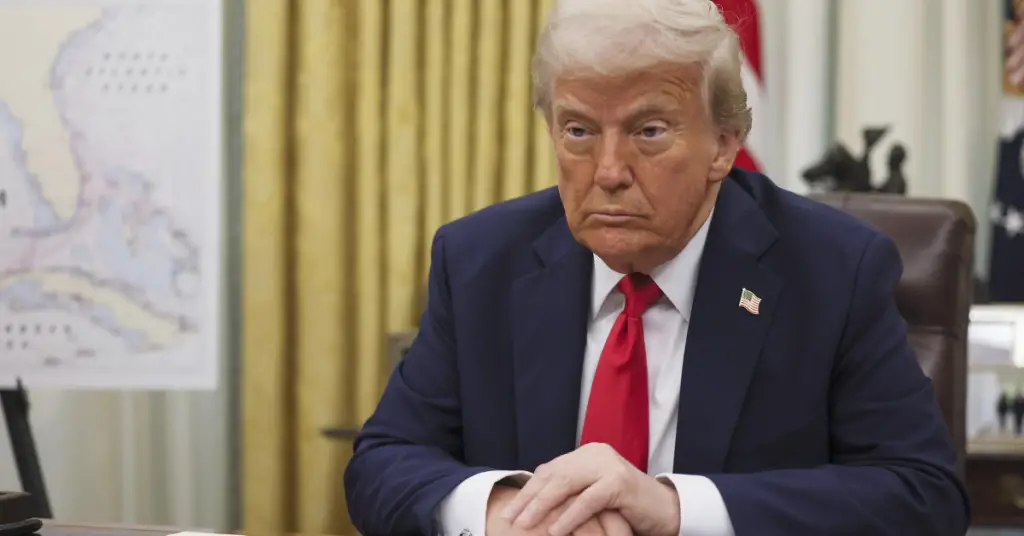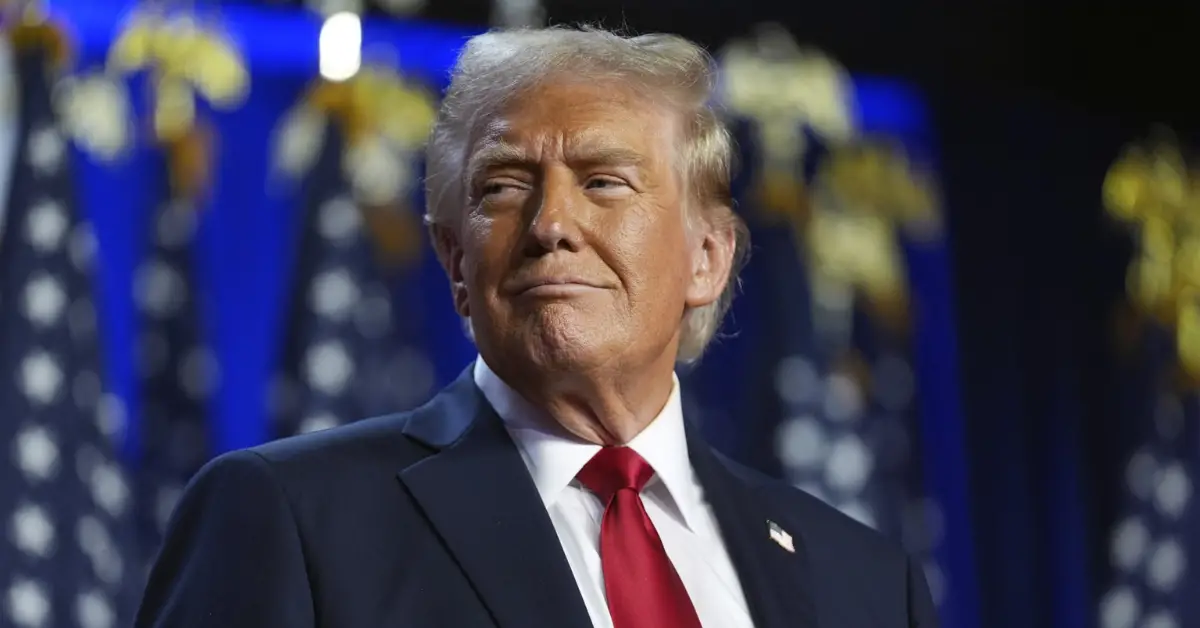The Atlantic editor-in-chief, Jeffrey Goldberg, and President Donald Trump explored a wide range of topics, from his past controversies to his vision for the future. The interview, held at the White House, revealed some compelling insights into Trump’s approach to leadership, foreign policy, and political retribution. But perhaps the most striking moment came when Goldberg asked the president about his efforts to target political enemies, an issue that has remained central to Trump’s post-presidency rhetoric.
Goldberg, who had unintentionally been added to a Signal group chat where sensitive military plans were shared by Defense Secretary Pete Hegseth, touched on the ongoing controversy surrounding what has now been dubbed the “Signalgate.” The incident saw the leak of sensitive plans from the U.S. Department of Defence, with Hegseth at the centre of the storm.
Despite the seriousness of the situation, Trump stood firmly behind Hegseth. Goldberg recalled that the president remained optimistic about Hegseth’s future, despite the fallout, including the Navy’s loss of a $60 million jet. According to Goldberg, Trump’s response was unapologetic and unyielding: Hegseth would be “just fine” despite everything.
However, as the conversation progressed, Goldberg steered the interview in a more controversial direction. He asked Trump about the growing sense of vengeance and retribution that seemed to characterise the president’s political behaviour, particularly in his efforts to target those he believed had wronged him. The response that followed was one that took many by surprise.
Trump’s Approach to Vengeance and Retribution
Goldberg, who had been following Trump’s political journey for years, noted that the most revealing moment of the interview came when he asked the president about his focus on political retribution. Trump, whose campaign promises included the idea of exacting revenge on his political opponents, responded with an explanation that suggested a deeper divide within his administration.
During the exchange, Goldberg pressed Trump on why he was so focused on using the full power of the federal government to target his enemies. Trump’s answer was telling. “Look, there are people around here who think we should just go forward and make policy and lead the country.
I’m in that camp,” he said, alluding to those within the White House who felt that moving forward with policy was the priority. However, he quickly followed up with a statement that seemed to distance himself from the more aggressive tactics that had defined much of his presidency.
Trump continued, “You may not believe it,” referencing Goldberg’s skepticism, before adding, “There are other people in the White House staff who think that we should really go after our enemies for what they did to us.”
Goldberg, in his interview notes, described how Trump seemed to place the blame for his vengeful rhetoric on his staff. He emphasized that the president was attempting to shift the focus away from his personal desire for retribution, instead suggesting that others within his administration were pushing for more aggressive action against political foes. This was an unexpected turn in the conversation, as Trump had previously made public statements indicating his commitment to investigating and punishing those who opposed him.
Trump’s Longstanding Rhetoric on Retribution
The idea of vengeance is not new to Trump. Throughout his political career, and particularly during his third presidential campaign, Trump repeatedly promised that he would take action against those who he believed had wronged him. In fact, his rhetoric on the campaign trail was filled with references to retribution, especially toward his political enemies. At a rally in Waco, Texas, for example, Trump boldly declared, “I am your retribution,” sending a clear message to his supporters that he would seek justice for the perceived wrongs he had suffered.
This focus on retribution has continued to shape Trump’s political identity even after he left office. Following his defeat in the 2020 election, Trump has frequently referenced the idea of “revenge” against his political opponents.
This has extended to executive actions, with Trump signing orders targeting top law firms that represented or worked with individuals he considers adversaries. Notably, Trump has directed attention toward law firms involved with former special counsels Jack Smith and Robert Mueller, both of whom led investigations into his administration and business dealings.
The Role of the White House Staff in Trump’s Retaliation Plans
What made Goldberg’s interview especially intriguing was Trump’s effort to distance himself from the vengeful policies that had been widely attributed to him. By pinning the blame on his White House staff, Trump seemed to suggest that the aggressive approach to retribution was not entirely of his own making.
This, in essence, painted the picture of a president who was caught between the more traditional elements of governance—focused on policy and progress—and those within his inner circle who were determined to pursue personal retribution against his enemies.

Goldberg, reflecting on this exchange, noted how Trump’s shifting responsibility for the retribution narrative could reflect the ongoing internal dynamics of the Trump administration. By placing the blame on others, Trump was able to maintain an image of a leader who preferred forward movement rather than personal vendettas. At the same time, it was clear that the desire for political payback had not waned.
Moreover, Trump’s reliance on his staff to execute these plans suggested a deeper entanglement between his political persona and the actions of those closest to him. It was no longer just about Trump himself seeking retribution—it was about the power of the presidency being used as a tool for revenge, with Trump at the center of it all.
The Impact of Trump’s Revenge Focus on American Politics
Trump’s focus on revenge and retribution could have far-reaching implications for the future of American politics. If he were to return to office, his continued emphasis on punishing his enemies could set a dangerous precedent for the use of federal power. While his supporters may view these efforts as justified, critics argue that using the government for personal vendettas undermines the principles of democracy and fairness that form the foundation of the American political system.
Furthermore, Trump’s rhetoric on retribution could deepen the already polarised nature of American politics. As the political landscape continues to divide along partisan lines, Trump’s vengeful approach may escalate tensions and fuel a cycle of retaliation between opposing political factions.
For now, Trump’s public statements and the revelations from Goldberg’s interview offer a window into the complex dynamics of his political strategies. While Trump has framed himself as a champion of justice for those who feel wronged by the establishment, his focus on revenge raises serious questions about the integrity and fairness of his actions.
Conclusion
Goldberg’s interview with Trump highlighted a crucial aspect of the former president’s character and political strategy—his unwavering desire for retribution. By pinning much of the blame on his staff, Trump sought to distance himself from the aggressive political moves that have characterized his post-presidency.
However, the interview served as a reminder that Trump’s rhetoric of revenge is far from over, and his continued focus on punishing political enemies could shape his future plans for power. Whether or not his political opponents should fear his retribution remains to be seen, but one thing is clear: Trump is not one to let go of a grudge.
Disclaimer: This article has been meticulously fact-checked by our team to ensure accuracy and uphold transparency. We strive to deliver trustworthy and dependable content to our readers.




